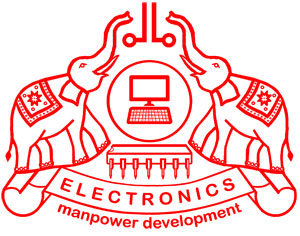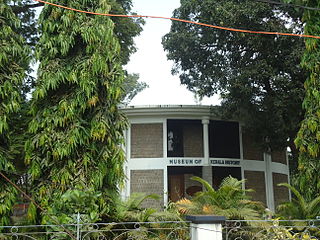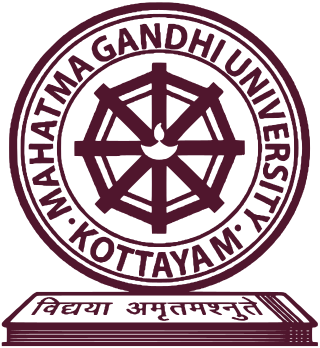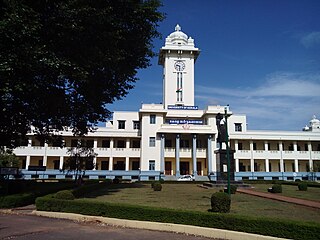
Cochin University of Science and Technology (CUSAT) is a state government-owned autonomous university in Kochi, Kerala, India. It was founded in 1971 and has three campuses: two in Kochi and one in Kuttanad, Alappuzha, 66 km (41 mi) inland.

Kanjirappally is a taluk and a town in Kottayam district situated about 38 km (24 mi) away from the district capital, in the state of Kerala, in southwestern India.

The CMS College, established in 1817, is one of the earliest Western-style colleges in India. The college is considered to be the oldest institution of higher education in India along with the Presidency College Calcutta. This college is located at Kottayam, in the Kottayam district of Kerala. It offers undergraduate and postgraduate courses in arts, commerce, and sciences. It also offers different vocational degree courses. It is affiliated to the Mahatma Gandhi University, Kerala. It has been given Autonomous status by the University Grants Commission, India. CMS College, Kottayam and Presidency College Calcutta, established in the same year, are the two earliest western-style colleges of India. The college is ranked 92nd among colleges in India by the National Institutional Ranking Framework (NIRF) in 2024.

The Institute of Human Resources Development (IHRD) is an autonomous technical educational research institute established by the Government of Kerala in 1987, with its headquarters at Thiruvananthapuram in India.

Edappally or Idappalli is a region in the city of Kochi, Kerala, India. It is a major commercial centre as well as a prominent residential region. Edappally junction is one of the busiest junctions in the city.

Mahatma Gandhi University (MGU), commonly referred to as MG University, is a state owned public university headquartered in Kottayam in the state of Kerala, India. It was established on 2 October 1983 on Gandhi Jayanti day. Mahatma Gandhi University has been approved by University Grants Commission (UGC) and accredited (A++) by the National Assessment and Accreditation Council of India. The university has around 300 affiliated colleges spread over five districts in central Kerala.

Kerala Agricultural University (KAU) is a state university for agricultural education, recognised as a State Agricultural University by the Indian Council of Agricultural Research (ICAR). It is situated in Vellanikkara, Kerala, India.

Poonjar is a small Indian town located on the eastern side of Kottayam district in Kerala state, India. Before the independence of India, Poonjar had been the part of Travancore princely state. Erattupetta, Teekoy, Bharananganam, and Vagamon are the nearest towns and villages of Poonjar. Taluk Headquarters, Pala is 18 kilometres away from Poonjar, Kanjirapally is 22.6 kilometres away from Poonjar and Thodupuzha is 34 kilometeres away from Poonjar.

The importance and antiquity of education in Kerala are underscored by the state's ranking as among the most literate in the country. The educational transformation of Kerala was triggered by the efforts of both Church Mission Society missionaries like Jon Munro and clergy of Catholic church like Fr Kuriakose Elias Chavara and Fr Charles Lavigne and were the pioneers that promoted mass education in Kerala, in the early decades of the 19th century. The local dynastic precursors of modern-day Kerala, primarily the Travancore Royal Family, the Nair Service Society, Sree Narayana Dharma Paripalana Yogam, and Muslim Educational Society (MES), also made significant contributions to the progress on education in Kerala. Local schools were known by the general term kalaris, some of which taught martial arts, but other village schools run by Ezhuthachans were for imparting general education. Christian missionaries and British rule brought the modern school education system to Kerala. Ezhuthu palli was the name used in earlier times. The word was derived from the schools run by the Buddhist monasteries. For centuries, villages used to set up an ezhuthupally or ashan pallikoodam with one or two teachers. Students used to go this school from nearby areas and learn languages, literature, mathematics, grammar etc. After completing this, students may continue study about specific subjects such as ayurveda, astrology, accounting etc. Censuses during the 1800s showed that Travancore, Cochin, and Kannur areas have many such schools.

Catholicate College, Pathanamthitta, established in 1952, is an institution of higher education at Pathanamthitta of Kerala, India. Catholicate College belongs to the first group of colleges in Kerala to receive academic accreditation from the National Assessment and Accreditation Council (NAAC). In the fourth cycle of (NAAC) re-accreditation, the college has been re-accredited by NAAC in A++ grade with CGPA of 3.53. The college is owned by Malankara Orthodox Church, founded by Catholicos Baselios Geevarghese II. The college was originally planned by Geevarghese Philoxenos, Metropolitan; it was founded in 1952, after his death, by Daniel Philoxenos Metropolitan, who became the first principal of the college.
The College of Applied Sciences, Adoor is an institution under the Institute of Human Resources and Development. It was established in 1994. The college is affiliated to the University of Kerala.

The College of Engineering, Kallooppara, is an engineering college located in Kallooppara in the Pathanamthitta District of Kerala. It was established by the Institute of Human Resources Development in 1999. The college is affiliated to the APJ Abdul Kalam Technological University and approved by All India Council for Technical Education.
Rajagiri is a part of the Carmelites of Mary Immaculate (CMI), an indigenous Syrian Catholic religious congregation founded in 1831. It is located in Rajagiri Valley, Kakkanad, Kochi. It was acquired after Indian independence and developed by the Sacred Heart province.

Rajagiri School of Engineering & Technology (Autonomous) (RSET) is an educational institution located in Kochi, Kerala, India, offering engineering education and research. RSET is affiliated to APJ Abdul Kalam Technological University and approved by the All India Council for Technical Education (AICTE).
George Varghese Koppara is a physicist from India. He has published considerable amount of International journals based on the topic crystals and crystallography. He was also the former Principal of Catholicate College, Pathanamthitta. His interest in environmental protection has inspired him to write book Jaivam Jeevanam, published by DC Books, Kottayam, Kerala. He has also written a book on latest trend in nanoscience and nanomaterials.

Abraham Mulamoottil is a Catholic priest, an author, a teacher, an innovator, and a philosopher. He obtained his PhD from the Catholic University of Leuven, Belgium. He is the founder and became the Principal of MACFAST. He also introduced unique post graduate courses like MSc Bioinformatics, MSc Plant Biotechnology, MSc Food Science & Technology and MSc Phytomedical Science for the first time in Kerala.

Dr. T. T. Sreekumar is an Indian writer, orator, social and literary critic, and political analyst. He is a professor at the School of Interdisciplinary Studies, English and Foreign Languages University (EFLU), Hyderabad, and serves as the Director of the Educational Multimedia Research Center (EMRC). Sreekumar is a bilingual author with published works in Malayalam and English and has written a fortnightly column in the Malayalam daily Madhyamam since 2014.













